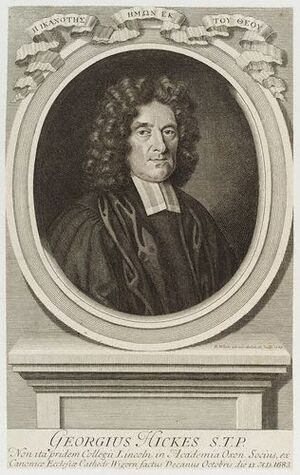George Hickes (divine) facts for kids
George Hickes (born June 20, 1642 – died December 15, 1715) was an English church leader and a very smart scholar. He is best known for his important work on old languages, especially Anglo-Saxon.
Contents
George Hickes' Early Life and Education
George Hickes was born in 1642 in a place called Newsham, near Thirsk in Yorkshire, England. He went to school in Thirsk and then to Northallerton Grammar School in 1652.
In 1659, he started studying at Oxford University. Later, he moved to Magdalen College and then to Magdalen Hall, which were also parts of Oxford. In 1664, he became a fellow at Lincoln College. A year later, in 1665, he earned his Master of Arts (M.A.) degree.
Becoming a Church Leader
In 1673, George Hickes earned a degree in divinity, which is the study of religion. In 1675, he became the rector of St Ebbes, a church in Oxford.
The next year, in 1676, he went to Scotland as a private chaplain to the Duke of Lauderdale. A chaplain is like a personal priest. While in Scotland, he received a Doctor of Divinity (D.D.) degree from St Andrews University.
In 1680, he became the vicar of All Hallows, a church in London. He was made a chaplain to the king in 1681. Then, in 1683, he was promoted to be the dean of Worcester Cathedral. This was a very important position in the church.
Challenges and Changes
George Hickes faced some big challenges during his life. He disagreed with King James II's policies. He also tried to help his brother, John Hickes, who was in trouble for helping people after a rebellion. Sadly, he could not save his brother.
During the Glorious Revolution of 1688, there was a change in who was king. George Hickes refused to swear loyalty to the new king and queen. Because of this, he was first suspended and then removed from his position as dean. When he heard that someone else was taking his place, he put up a protest notice on the cathedral doors.
After this, he had to hide in London for a while. He was then sent to France by other church leaders who also refused to swear loyalty. They wanted to make sure their church group could continue. When he came back in 1694, he was made a bishop in their special church group, which was called the non-juring church. This group was made up of people who would not take the oath of loyalty to the new rulers.
Later in his life, George Hickes spent a lot of time writing and debating. In 1713, he helped consecrate (officially make) more bishops for the non-juring church.
George Hickes' Important Writings
George Hickes is mostly remembered today for his amazing work on languages, especially old languages like Anglo-Saxon. He was a pioneer, meaning he was one of the first to do this kind of work.
His most famous books on languages are:
- Institutiones Grammaticae Anglo-Saxonicae et Moeso-Gothicae (published in 1689). This was a grammar book for Anglo-Saxon and Gothic languages.
- Linguarum veterum septentrionalium thesaurus grammatico-criticus et archæologicus (published between 1703 and 1705). This was a huge collection of information about old northern European languages.
He also wrote about religious topics. His books Of the Christian Priesthood and Of the Dignity of the Episcopal Order were very important in Anglican theology. These books discussed the role of priests and bishops in the church. His ideas even led to a big debate in the church called the Bangorian controversy.
Other writings by George Hickes include:
- Collections of Controversial Letters (1705 and 1710).
- A collection of his Sermons (1711).
- Posthumous Discourses (published after his death in 1726).
Many of his letters are still kept in different collections today, giving us a look into his life and thoughts.
Sources
- John Henry Overton, The Nonjurors (1902).
- Harris, Richard L. A Chorus of Grammars: The Correspondence of George Hickes and His Collaborators on the "Thesaurus Linguarum Septentrionalium." Toronto: Pontifical Inst. of Mediaeval Studies, 1992.
- George Hickes, "Linguarum Veterum Septentrionalium Thesaurus Grammatico-Criticus et Archaeologicus", Oxoniae, 1705. Full Text at Internet Archive
 | Calvin Brent |
 | Walter T. Bailey |
 | Martha Cassell Thompson |
 | Alberta Jeannette Cassell |


